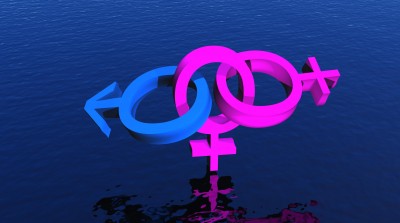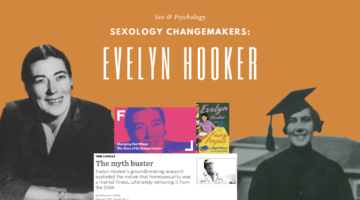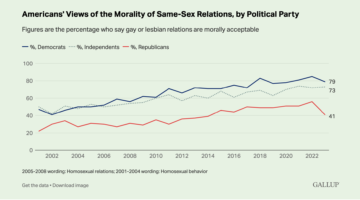Sex Question Friday: Are Women More Likely To Be Bisexual Than Men?
May 4, 2012 by Justin Lehmiller
Every Friday on the blog, I answer sex questions submitted to me by actual college students. This week, we’re talking about bisexuality. Many students have asked me whether it is really possible for someone to be attracted to both men and women (a question I have previously answered here). However, the student who asked this week’s question wanted to know whether there is a difference between male and female bisexuality.
I have heard of research that determined men can only be attracted to one sex whereas women can legitimately be bisexual. Is this true?
Not exactly. Men’s attraction is not necessarily limited to one sex. In fact, a recent lab experiment found that bisexual men experienced high levels of sexual arousal in response to both male sexual images and female sexual images (to read more about this study, click here) [1]. The arousal pattern of bisexual men was distinct from that of heterosexual and homosexual men, who only experienced arousal in response to images of their desired sex (i.e., gay men were only aroused by images of men, while heterosexual men were only aroused by images of women). Were bisexual men equally aroused by both men and women? Not necessarily. Bisexual men usually experienced stronger arousal in response to one sex than the other (some were more strongly attracted to men, while others were more strongly attracted to women). However, this should not be taken to mean that bisexuality doesn’t really exist in men, because it does—it’s just that while bisexual men were indeed highly aroused by both sexes, they usually found one sex to be slightly more arousing.
Although it is clearly possible for men to have some degree of attraction to both sexes, bisexuality seems to be more common among women than men. As some evidence of this, research has found that self-identified heterosexual women exhibit significant levels of genital arousal in response to male-male, female-female, and male-female pornography, whereas heterosexual men do not [2]. This suggests that men and women have different levels of erotic plasticity, such that women are capable of being turned on by a wider range of sexual targets than are men. Also consistent with this idea are the results of a few studies indicating that some women go back and forth between having relationships with men and women and change their sexual identity to be consistent with their sexual desires (a phenomenon known as “sexual fluidity”) [3]. In contrast, reports of fluid sexuality among men are less common. Women’s greater erotic plasticity is also evidenced by the fact that women are less likely than men to develop sexual fetishes (i.e., to become fixated on certain objects or body parts in order to experience sexual arousal and pleasure).
In summary, while it is indeed possible for both men and women to be bisexual, evidence from a variety of sources suggests that bisexuality may be a more common occurrence among women than men.
For previous editions of Sex Question Friday, click here. To send in a question for a future edition, click here.
Want to learn more about Sex and Psychology? Click here for previous articles or follow the blog on Facebook (facebook.com/psychologyofsex), Twitter (@JustinLehmiller), or Reddit (reddit.com/r/psychologyofsex) to receive updates.
[1] Rosenthal, A. M., Sylva, D., Safron, A., & Bailey, J. M. (2011). Sexual arousal patterns of bisexual men revisited. Biological Psychology, 88, 112-115.
[2] Chivers, M. L., Rieger, G., Latty, E., & Bailey, J. M. (2004). A sex difference in the specificity of sexual arousal. Psychological Science, 15, 736-744.
[3] Diamond, L. (2008). Sexual Fluidity: Understanding Women’s Love and Desire. Cambridge, MA: Harvard University Press.
Image Source: 123rf.com
You Might Also Like:

Dr. Justin Lehmiller
Founder & Owner of Sex and PsychologyDr. Justin Lehmiller is a social psychologist and Research Fellow at The Kinsey Institute. He runs the Sex and Psychology blog and podcast and is author of the popular book Tell Me What You Want. Dr. Lehmiller is an award-winning educator, and a prolific researcher who has published more than 50 academic works.
Read full bio >


